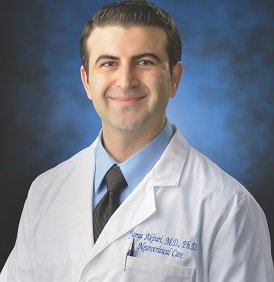Yama Akbari
Associate Professor, Neurology, School of Medicine
Associate Professor, Neurological Surgery, School of Medicine
Associate Professor, Beckman Laser Institute & Medical Clinic
Dr. Yama Akbari is a critical care neurologist and neuroscientist who is an Associate Professor of Neurology and Neurological Surgery at UC Irvine, specializing in neuro-critical care. He is a physician-scientist who splits his time between clinical duties taking care of patients in the Neuro-Intensive Care Unit (Neuro-ICU) at UC Irvine Medical Center and running a basic science/translational research lab focused on consciousness, coma, and cardiac arrest/resuscitation.
Dr. Akbari obtained a B.S. in psychobiology from UCLA followed by a combined M.D./Ph.D. program at UC Irvine, where his Ph.D. was focused on molecular neuroscience in the Department of Neurobiology and Behavior. He then completed a neurology residency at UCLA followed by a 2-year neurocritical care fellowship at Johns Hopkins University.
In 2012, he was recruited back to UC Irvine as a tenure-track physician/scientist where he established UC Irvine’s first cardiac arrest and resuscitation laboratory. The lab was built to mimic a Neuro-Intensive Care Unit (Neuro-ICU) to optimize translational potential, thus incorporating multimodal monitoring with neurophysiology, cardiac/pulmonary physiology, and signal processing of brain connectivity. In close collaboration with the Beckman Laser Institute & Medical Clinic, the multimodal platform broadened to include advanced optical imaging of cerebral blood flow and brain metabolism during cardiac arrest and resuscitation.
The Akbari lab utilizes a wide range of in vivo and in vitro techniques carrying bench-to-bedside research investigating changes in cerebral hemodynamics, brain metabolism, and brain connectivity during hyperdynamic changes in perfusion during cardiac arrest (including clinical death) and resuscitation back to life. The goal of the lab is to improve our understanding of consciousness and coma due to various types of acute brain injury, as well as improving resuscitation maneuvers for the treatment of cardiac arrest to protect the brain. Alongside taking care of critically ill patients and running his research lab, he also teaches students (undergraduates, graduate, and medical), as well as residents and clinical fellows.

